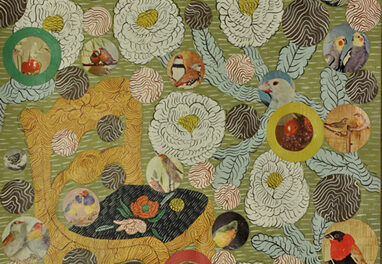Last fall, rumors of a new dramatic soprano in the area led me to the campus of Salem College for Barbara DeMaio Caprilli’s recital. I was wowed by the huge sound of a diva firing major arrows from her repertory’s quiver. With familiar arias of Tosca, Lady Macbeth, Norma, Maddalena, La Gioconda, and Manon Lescaut, this critic was on well-known ground. This was not the case in her latest program, “My Favorite Composers,” given in the Salem Fine Arts Center’s Shirley Recital Hall on April 21. Caprilli returned to her roots in American musical theater for a broad survey of important composers and wordsmiths. This program paralleled a survey course she is teaching this semester, and the proceeds went toward the replacement of an antiquated light board for the drama program. Often I had to draw upon memories of the old Ed Sullivan Show, which presented then-contemporary performers of this repertory such as Mary Martin, Ethel Merman, and Angela Lansbury.
As might be expected of a singer with the role of Turandot in her active repertory, Caprilli had no problem filling the hall with sound. She explained that in contrast to her “legitimate singing” style, much of this program called for a “chest belting out” of a song. There were no printed programs. Seated in the curve of the piano with a bottle of water on an adjacent stool, rather like being in an intimate club setting, she gave concise backgrounds for the selections and the dialogue leading up to “hit” songs. At the keyboard was Barbara Lister-Sink, a phenomenal, dramatically equal partner. The hall humidity was very dry, the pollen count was the highest to date and speaking plus singing made water a necessity.
The program opened with Kate Smith’s signature song, “God Bless America!” by Irving Berlin; most of the stanzas were given, and it ended in a soaring climax that helped set the mood for the rest of the evening. The higher social standing of Cole Porter was reflected in the more sophisticated lyrics and wordplay of “Night and Day,” originally from The Gay Divorcée but also used in a movie that bears the song’s title. Caprilli said that in these early shows the songs were the center of attention while the drama was almost incidental. This changed with a series of Princess Theatre shows that involved Jerome Kern, Oscar Hammerstein, P.G. Wodehouse, and others. From Showboat, she sang the torch song, “Bill.” She mentioned the importance of the show in providing the first decent singing role for an African American but, since she is not a bass, she did not essay “Old Man River.”
Lister-Sink rivaled the keyboard fireworks of William Bolcom as she partnered Caprilli in the syncopations of “I Got Rhythm” by George Gershwin. The soprano’s full, rich sound was used to good effect in “Summertime” from Porgy and Bess, but the fine performance did not erase memories of Leontyne Price heard live and on recordings.
Caprilli brought a lot of mugging to the role of the awkward lass in Oklahoma as she sang “I’m just a girl who cain’t say no.” She recalled hearing the original Maria, Mary Martin, before singing “The hills are alive with the sound of music.” From Mame, she sang “Did he need a stronger hand?” The role of Rosabella in Frank Loesser’s Most Happy Fellow is more operatic in style. A dry throat spoiled the finish, and the singer quipped that there was nothing like a live performance to give you the full embarrassment of such a glitch. From Loewe’s My Fair Lady, she sang “I could have danced all night.” This brought back memories of high school English in which Shaw’s play, Pygmalion, and the musical adaptation were studied.
After intermission, quite a few samples featuring Stephen Sondheim as a lyricist and a composer were given. His words were featured in Momma Rose’s “Some People,” from Jule Styne’s Gypsy, and in an elegant rendition of “I feel pretty,” from Leonard Bernstein’s West Side Story. Since I have long treasured the DVD of A Funny Thing Happened on the Way to the Forum (for which Sondheim wrote lyrics and music), I fully relished the agile wordplay of “Comedy Tonight.” A torch song from another of his lyrics-and-music efforts, Follies, was followed by “Send in the Clowns” from A Little Night Music. Lister-Sink described the keyboard part as being Chopinesque. Also from Follies, Caprilli belted out a rousing “I’m just a Broadway Babe.”
Two encores tied in nicely with the theme of leaving or parting, and many in the audience seemed to know the words when Caprilli invited them to join her in the reprise of “Edelweiss,” from The Sound of Music. Her second encore was ” Could I Leave You?” from Sondheim’s Follies.











